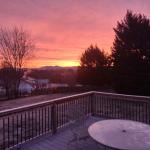Living off the land is not romantic. It is a necessity for many where I live. A lot of families know how to find food when the money is low. My mother’s family was no different. They knew how to hunt and gather. My grandfather only had a 3rd grade education. He raised a large family and read his King James Bible every Sunday. Given his education level, I can imagine how little he understood. But he did his best. My own education helps understand the spirituality of my people who lived in poverty and lived off the land.
Funny Stories of Living in Poverty
“My name is Don,” I began. “I am a United Methodist minister in East Tennessee,” That is as far as I got. I was stuck in how I could introduce myself to these scholars. In the eyes of many, there is nothing exceptional about where I perform my ministry. The feelings of inadequacy that plagued me all of my life were present. This time the feeling manifested itself as a middle-aged white man belated working on a doctorate. My peers were mostly younger clergy who served in more interesting sounding places.
“I pastor a church in Punxsutawney, Pennsylvania,” I heard one pastor say, “Phil is an honorary member of our church.” Everyone knows about the weather predicting groundhog. My grandpa used to ask, “who told the groundhog which day was his?” It gave me an idea.
My turn came. “My name is Don Jones. I pastor a couple of United Methodist churches in East Tennessee.” So far so good, I thought. “Groundhogs are also welcome in our churches,” I waited a few beats. “Usually in a covered dish.”
Most of the students and faculty thought it was funny. I meant for it to be. But later, one other middle-aged white male student said, “Everyone was laughing. But that’s real, isn’t it?”
The Stark Truth of Living Off the Land
Indeed. It is all too real for many in Appalachia. Wild food is part of life. There are expensive restaurants that serve “wild caught trout” and “venison.” I am tempted to go to one and loudly exclaim, “That’s what poor people eat!” I wonder if I can maintain a horrified expression with laughing in derision.
I am critical of people who want to talk about Appalachia while perched on towers. It does not matter if they claim roots in the area. Christianity has lived off the land here too. Evangelists rode circuits into the frontier to preach to various communities in the early days of the American republic. “Union” churches where different denominations shared meeting spaces were constructed. As the population grew denominational distinctions were made. Family, community, and church were intertwined. Revival meetings provided the main entertainment in the summer months. People found religious experiences, spouses, lifetime callings, and salvation (sometimes multiple times) during those months. Appalachian Christianity was the opiate of the people, the source of authority for some, and spiritual magic for others.
Faith Expressions
Appalachian forms of religious expression reflect the culture of the people whose lives are hard. There are strict rules that define how life is lived. Prosperity gospel preaching justifies the wealthy and appeals to the poor much like it does in impoverished areas of the third world. The feelings of inadequacy come from the suspicion of “outsiders” who may look down on us.
Charity is another religious expression. But only certain churches are known as places for help. We sometimes give away food, or help with gas money, or electric bills. Many churches only have someone around on Sundays with pastors having to hold down another job. The food we give away often includes excess wild meat from hunters. But charity does not provide adequate medical care or housing. Charity, like living off the land, can only sustain for a little while.
Liberation Theology For Living Off The Land
A theology and spirituality of liberation is needed for our area. There is much to discourage people who live here. Tourism, mining, agribusiness, and government are the primary areas for employment. The jobs are too few and pay little. Resentments abound. The connection to the land should be the primary avenue for experiencing the Creator god spoken about in the churches. We should not be giving our resources away to tourists or anyone else who wants to enjoy life here for a brief time.
The land, the biodiversity, and mineral wealth should be considered a trust from the Creator. The churches should be the community organizations calling for the defense of these gifts. Others come to take our riches away. We are given poverty and scolded for mismanagement. Our people, all of our people, should be taking those riches back. Romanticizing Appalachia allows us to be pitied and disregarded. God is among us. And does not allow us to be pitied and demands we not be disregarded. We can build our lives too.
Living With The Land
It is Christmas time 1991. The woman and intend to marry and I are driving to the country to visit my mom’s family. “My uncle raises his own turkeys,” I begin, “it won’t taste like Butterball.” I then add. “There will be some wild meat on the table too.” I did not know what kind would be available.
When we are filling our plates, she asks about the stew. “It’s bear.” I said. She knew my sense of humor and didn’t believe me. Later, my cousin’s young son was given a small piece of the greasy salty meat from the stew. We watched him greedily chew it up and swallow. “I told y’all he likes wild meat,” his dad said proudly. My intended’s eyes got wide as she thought, “My God! It’s Christmas with the Clampetts!” I was telling the truth. My uncle not only raised turkeys on his property bordering the National Park. He was a poacher too.
I love that memory.












